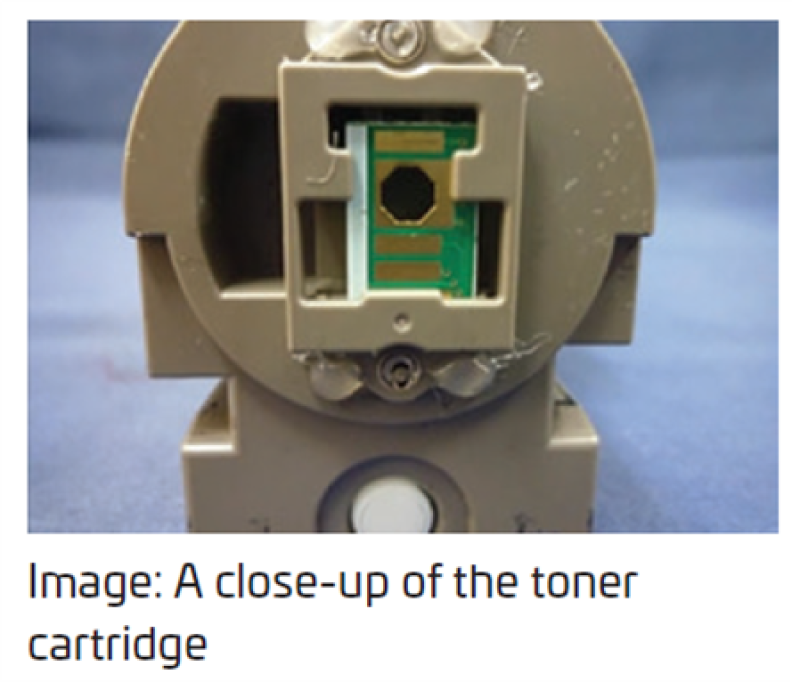Summary of the case
Ricoh owns two patent rights: JP4886084, entitled "Information storage device, removable device, developer container and image forming apparatus", and JP5780375 and JP5780376, entitled "Information storage device and removable device”. Ds Japan removed electronic components from used Ricoh toner cartridge products, compatible with printers manufactured and sold by Ricoh, and replaced them with electronic components manufactured by Ds Japan (see below). It refilled the toners and prepared them to be sold as recycled toner cartridge products.

Ricoh sought an injunction against Ds Japan on selling its product and the disposal of its products and electronic components, as well as damages. Ricoh argued that the electronic components manufactured by Ds Japan fell within the technical scope of Ricoh’s invention, and Ds Japan’s act infringed each patent right.
The Tokyo District Court dismissed Ricoh’s claim, holding that Ds Japan’s electronic components fell within the technical scope of each invention, and that, as a whole, Ricoh’s actions violated the Antimonopoly Act. Furthermore, Ricoh’s injunction against Ds Japan on manufacturing and selling its product and a damages claim based on each patent right reasonably corresponded to an abuse of rights.
Judgment of March 29 2022, IP High Court
The IP High Court (Presiding Judge Otaka) modified the Tokyo District Court’s judgment and accepted Ricoh’s injunction against Ds Japan on manufacturing and selling its product and the damages claim. The IP High Court affirmed the infringement and validity, and held as follows on an abuse of rights.
Comparing the function of Ricoh's printer equipped with a genuine Ricoh product with Ricoh’s electronic components, on which rewrite restriction measures are taken, against that of Ricoh’s printer equipped with a recycled product – that is, a used Ricoh product with refilled toner – the following was found:
A Ricoh printer equipped with a recycled product will display “?” as the remaining quantity of the toner, although the remaining quantity of the toner or a warning sign will not be displayed, which differs from Ricoh’s printer equipped with a genuine Ricoh product. However, Ricoh’s printer equipped with a recycled product will stop printing when the toner runs out and displays an indication such as "Toner has run out”, in a way not different from Ricoh’s printer when equipped with a genuine product, which may not interfere with the printing function.
A Ricoh printer equipped with a recycled product will display “Ready to print” beside “?” on an indicator that shows the remaining quantity of the toner. It can therefore be easily recognised that the remaining quantity of the toner is not displayed because it is a recycled product, and the user is not deemed to be concerned that the printing function will be affected.
Furthermore, even if the remaining quantity of the toner is not displayed, users can prepare extra toner in advance. As such, the users’ burden may not be great.
In light of the above, it is recognised that there are users who select recycled products in consideration of the above functional differences and price difference between the genuine products and the recycled products on which the remaining quantity of the toner is not displayed. In addition, an indication of the remaining quantity of the toner cannot be a condition for public bidding.
On the other hand, for the concern that users may feel uneasy about the fact that the remaining quantity of the toner is not displayed, the rRecycling companies can address users’ concerns about the remaining quantity of toner not being displayed by indicating that the recycled products can print, but the remaining quantity of the toner cannot be displayed because it is a recycled product.
It is technically possible to manufacture electronic components that do not fall within the technical scope of inventions 1 through 3 by devising the shape of the electronic components and replacing them with Ricoh's electronic components, avoiding the infringement of each patent right, to indicate the remaining quantity of the toner. In the market of toner cartridges for Ricoh printers, the degree of disadvantage for recycling companies due to the rewrite restriction measures is considered small.
Ricoh argued that the reason for taking the rewrite restriction measures was to eliminate harmful effects because if the rewrite restriction measures were not taken, Ricoh printers would display the remaining quantity of the toner of a third party's recycled products, the quality of which cannot be controlled by itself, and Ricoh would not be able to control the accuracy of a display of the remaining quantity of the toner.
Ricoh then stated that, as a business strategy, among the toner cartridges corresponding to Ricoh printers, it has adopted Ricoh's electronic components installed in Ricoh's product corresponding to the C830 and C840 series of high-end printers, which shows a reasonable rationality. In addition, as described above, it is technically possible to manufacture electronic components to avoid infringement of each patent right.
Considering these factors, it cannot be recognised that Ricoh's enforcement of each patent right on Ds Japan’s electronic components installed in used Ricoh products is solely for the purpose of excluding Ds Japan’s recycled products from the market.
In view of the above fact finding and other circumstances in this case, it cannot be said that Ricoh's enforcement of each patent right and seeking an injunction and damages against DS Japan with respect to Ricoh’s electronic components violates the Antimonopoly Act as an interference with a competitor's transactions.
Practical tips
Professor Tamura criticised the Tokyo District Court judgment as follows: The Tokyo District Court judgment was considered unique in the respect that it dismissed the patentee's claim based on the abuse of rights doctrine, taking the exhaustion doctrine into consideration, and with the help of the Antimonopoly Act. By contrast, in this case, it was sufficient to deny patent infringement based on the exhaustion doctrine, an inherent interpretation of the Patent Act, or the abuse of rights doctrine, a principle of private law in general, without referring to the Antimonopoly Act. However, the IP High Court denied exhaustion, as did the Tokyo District Court.
The IP High Court then held that, unlike the Tokyo District Court, there was no violation of the Antimonopoly Act. What caused this difference? This seems to have been critical, because Ricoh, lost in the Tokyo District Court, in order to overcome the avoidability of infringement of each patent right, the cause it lost, argued in the IP High Court that the Tokyo District Court judgment was wrong as it held that Ricoh insisted the actions of the recycling companies resulted in either a patent infringement or a decline in competitiveness. Ricoh claimed and proved that the recycling companies were able to manufacture recycled products that do not display “?”, avoiding infringement of each patent right, by providing the result of an experiment to show that “it was confirmed that remaining quantity of the toner was displayed instead of ‘?’ and Ricoh’s printer operated normally”.
As a result, the IP High Court found that the degree of restriction on competition was low and that the purpose of excluding recycled products from the market was not recognised.
The case has been appealed to the Supreme Court and attention must be paid to its future ruling.
The judgment of September 30 2021, the Tokyo District Court (Presiding Judge Asakura) (Elecom et al. v. Brother Industries) is another aftermarket case of printer like this case, holding that design changes to printers concerning consumables were in violation of the Antimonopoly Act.











